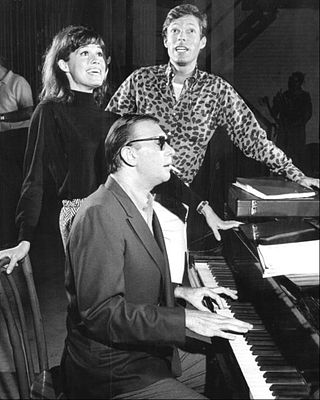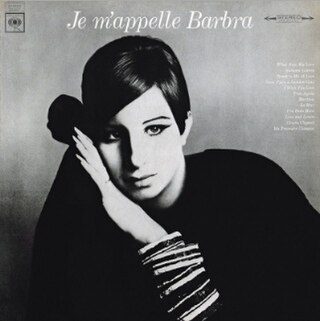Related Research Articles

Michel Jean Legrand was a French musical composer, arranger, conductor, jazz pianist, and singer. Legrand was a prolific composer, having written over 200 film and television scores, in addition to many songs. His scores for two of the films of French New Wave director Jacques Demy, The Umbrellas of Cherbourg (1964) and The Young Girls of Rochefort (1967), earned Legrand his first Academy Award nominations. Legrand won his first Oscar for the song "The Windmills of Your Mind" from The Thomas Crown Affair (1968), and additional Oscars for Summer of '42 (1971) and Barbra Streisand's Yentl (1983).

Burt Freeman Bacharach was an American composer, songwriter, record producer, and pianist who is widely regarded as one of the most important and influential figures of 20th-century popular music. Starting in the 1950s, he composed hundreds of pop songs, many in collaboration with lyricist Hal David. Bacharach's music is characterized by unusual chord progressions and time signature changes, influenced by his background in jazz, and uncommon selections of instruments for small orchestras. He arranged, conducted, and produced much of his recorded output.

Harold Lane David was an American lyricist. He grew up in New York City. He was best known for his collaborations with composer Burt Bacharach and his association with Dionne Warwick.

Henry Robert Merrill Levan was an American songwriter, theatrical composer, lyricist, and screenwriter. Merrill was one of the most successful songwriters of the 1950s on the US and UK single charts. His musicals for the Broadway stage include Carnival! and Funny Girl (lyrics).
Herbert Kretzmer OBE was a South African-born English journalist and lyricist. He was best known as the lyricist for the English-language musical adaptation of Les Misérables and for his collaboration with French singer and songwriter Charles Aznavour.
Harvey Lester Schmidt was an American composer for musical theatre and illustrator. He was best known for composing the music for the longest running musical in history, The Fantasticks, which ran off-Broadway for 42 years, from 1960 to 2002.

The Movie Album is the thirtieth studio album by American singer Barbra Streisand, released on October 14, 2003, by Columbia Records. Overall, her sixtieth release with her record label, it was executively produced by Streisand and her manager, Jay Landers. A concept album, it contains twelve songs from the singer's favorite films ranging in release from 1935 to 1988. While curating the album, Streisand was inspired by her marriage to actor James Brolin to record songs about love and relationships. To better fit her needs, songwriting duo Alan and Marilyn Bergman were commissioned to add lyrics to several of the songs Streisand had chosen to record.

"Papa, Can You Hear Me?" is a 1983 song composed by Michel Legrand with lyrics by Alan Bergman and Marilyn Bergman, for Barbra Streisand in the title role of Yentl. The song was nominated for Best Original Song at the 56th Academy Awards; Streisand's longtime friend Donna Summer performed it during the ceremonies. The song peaked at No.26 at Billboard's Adult Contemporary.
Charlie Midnight is an American songwriter and record producer and the founder of Midnight Production House. He has been nominated for the 1987 Grammy Award for Best R&B Song, two Golden Globes, and has been a producer and/or writer on several Grammy-winning albums, including The Bodyguard: Original Soundtrack Album, Joni Mitchell's Turbulent Indigo, and Marlo Thomas & Friends: Thanks & Giving All Year Long. He also is a writer on the Barbra Streisand Grammy-nominated, Platinum-selling Partners album having co-written the Barbra Streisand and Andrea Bocelli duet "I Still Can See Your Face".

Je m'appelle Barbra (1966) is the eighth studio album released by American singer Barbra Streisand. She sings much of the album in French.

What About Today? is the eleventh studio album released in July 1969 by Barbra Streisand. It is considered to be her first attempt at recording contemporary pop songs and features songs by The Beatles and Paul Simon, among others.

Yentl is a 1983 American romantic musical drama film directed, co-written, co-produced by, and starring American entertainer Barbra Streisand. It is based on Isaac Bashevis Singer's short story "Yentl the Yeshiva Boy".
Charles Dumont, is a French singer and composer. Dumont is best remembered for writing or co-writing over 30 of the most well-known songs recorded by singer Édith Piaf, including "Non, je ne regrette rien".
Michel Vaucaire was a French lyricist. He often collaborated with the composer Charles Dumont in whom he always had confidence to put his lyrics to music. He is perhaps best known as the author of "Non, je ne regrette rien", written in 1956, with its most notable recording completed in 1960 by singer Edith Piaf.
Michel Rubini is an American musician, conductor, arranger, producer, songwriter and composer. A professional classical pianist since early childhood, he was a prolific session musician of the 1960s and '70s, part of a group known as "The Wrecking Crew", and worked with such artists Ray Charles, Frank Zappa, Sonny and Cher and Barbra Streisand. He has also written several film scores, notably for Tony Scott's The Hunger (1983) and Michael Mann's Manhunter (1986), Silhouette (1990) starring Faye Dunaway and the television series Capitol (1982-87), The Hitchhiker (1984-87) and Tales from the Crypt (1990). He is the son of violinist Jan Rubini.

Alan Bergman and Marilyn Keith Bergman were an American songwriting duo. Married from 1958 until Marilyn's death, together they wrote music and lyrics for numerous celebrated television, film, and stage productions. The Bergmans enjoyed a successful career, honored with four Emmys, three Oscars, and two Grammys. They are in the Songwriters Hall of Fame.

"If I Close My Eyes" is a song recorded by American vocalist Barbra Streisand for the 1972 American film Up the Sandbox. It was distributed for radio airplay in January 1973 through Columbia Records, while in later years it was made available as a 7" single. The single was written and produced by Billy Goldenberg, with Alan Bergman and Marilyn Bergman also contributing to the lyrics. Streisand requested Goldenberg to take the film's score and create a song out of it. During a late night phone conversation, he developed a melody and then the song was created.

"How Lucky Can You Get" is a song recorded by American vocalist Barbra Streisand for the official soundtrack to the 1975 film Funny Lady. It was released as a 7" single in April 1975 through Arista Records. The song was written by Fred Ebb and John Kander, while production was handled by Peter Matz. "How Lucky Can You Get" is one of the new songs on the soundtrack, with its origins coming from Fanny Brice, the character Streisand portrays in the aforementioned film. The music pertains to Brice herself, particularly the sarcastic nature of the lyrics that are accompanied by an "insistent" melody and production. It was suggested that the pattern of the lyrics may have been influenced by Giacomo Puccini's 1896 opera, La bohème.
Jay Landers is an American record producer, songwriter, A&R executive, music publisher and writer of liner notes best known for his work with Barbra Streisand, Johnny Mathis, Frank Sinatra, Neil Diamond, and Hilary Duff.
"Pieces of Dreams" is a song from the 1971 film of the same name. It was composed by Michel Legrand, the lyrics were written by Alan and Marilyn Bergman. It was performed by Peggy Lee as the title track on the film.
References
- ↑ "Hal Shaper | Biography & History | AllMusic". AllMusic. Retrieved 2017-01-03.
- 1 2 3 4 5 6 Freedland, Michael (2004-03-01). "Hal Shaper". The Guardian. ISSN 0261-3077 . Retrieved 2017-01-03.
- 1 2 3 Association, International Songwriters. "International Songwriters Association (ISA) Songs And Songwriting • Hal Shaper". www.songwriter.co.uk. Retrieved 2017-01-03.
- 1 2 "Hal Shaper | Obituaries | The Stage". The Stage. 2004-02-16. Retrieved 2017-01-03.